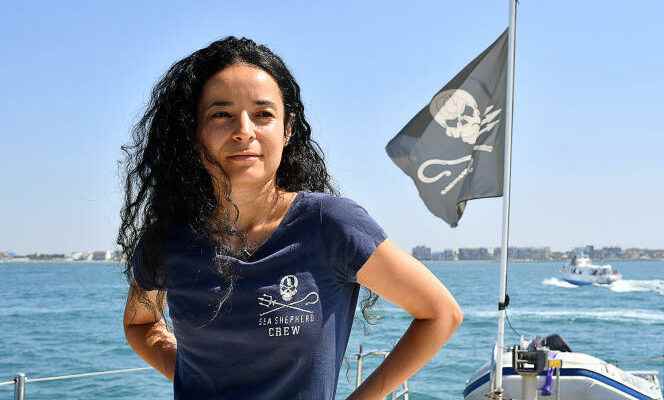Lamya Essemlali is not one to give up. When the president of Sea Shepherd France, the association for the defense of marine biodiversity, arrives on September 19 on the beach of Ty an Quer, in Ploéven, near Douarnenez (Finistère), where a whale has just run aground , we make her understand that she is not really welcome. Around the large black mass of 19 meters, a safety cordon filters the staff of the Iroise marine natural park and the observatory of mammals and sea birds Pelagis. “Only people trained by Pelagis can intervene”, explains Will Davin, engineer at Pelagis.
No matter. Lamya Essemlali does not stop at this ban: she sends an SMS to the Secretary of State for the Sea, Hervé Berville. And obtains permission to approach the cetacean. She goes to get sheets from the locals to swaddle him and protect him from the sun. Volunteers dig a ditch around him to relieve him of his weight. Lamya Essemlali counts the animal’s breaths, monitors its smell, its vent to make sure it can survive. A sympathizer finds a backhoe to dig a channel to the sea. The tide is rising. “We gave impulses to make him move and suddenly he started to fight. He wanted to live.” she says, by video, from Douarnenez.
For Elodie Pouet, a volunteer with the association since 2006, this rescue sums up Lamya Essemlali perfectly: “She makes the impossible possible despite our limited means. » But, a week later, a whale, most certainly the same one, was found dead on Tristan Island, at the bottom of Douarnenez Bay. “If we had to do it again, we would do exactly the same thing”, confirms Lamya Essemlali.
Political Immersion
With a budget of 3 million euros, three employees and 200 volunteers, Sea Shepherd does not have the scale of large structures like Greenpeace, which has resources ten times greater. So its president multiplies. In Mayotte, it prevents poachers from capturing sea turtles; in Brittany or in the Bay of Biscay, it monitors fishermen who do not declare dolphin catches. And when a beluga gets lost in the Seine, she stays awake for thirty-six hours trying in vain to take it out to sea.
“I see a corollary between racism and speciesism. We tell ourselves that the suffering of someone who is different from us is worth less than our own. » Lamya Essemlali
You have 55.82% of this article left to read. The following is for subscribers only.
